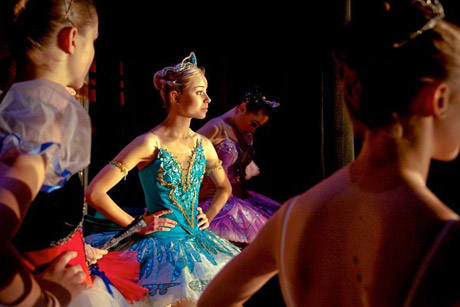It would seem as though a documentary sub-genre has emerged, producing a template for numerous competition-based films that chronicle the efforts of participants as they prepare and train, leading up to the inevitable dramatic performance.
Similar to 2002's Spellbound, which chronicled eight child contestants in the Scripps National Spelling Bee, Bess Kargman's First Position follows a half-dozen talented young dancers as they train for and compete in the Youth America Grand Prix. It's a prestigious international ballet competition that rewards its winners with trophies and, more importantly, the chance at scholarships with the world's top ballet schools and contracts at dance companies.
With an emphasis on diversity, Kargman focuses on students from various parts of the world to paint a broader picture of the competition and showcase that ballet dancers come from all walks of life. Amongst these students are 14-year-old Michaela, a former war orphan from Sierra Leone, now living with her adopted Caucasian family in Philadelphia, as well as 16-year-old Joan Sebastian, who was uprooted from Colombia to live and train in NYC.
Miko and Jules Fogarty, ages 12 and ten, children of a Japanese mother and American father from California, help round out the group, as does 11-year-old Aran, an army brat currently residing on a U.S. Air Force base in Italy. And to contextualize the diversity, there's Rebecca, a 17-year-old, privileged Barbie Doll blonde from Maryland.
All of the students, save for Jules, who realizes how little he enjoys ballet, are incredibly talented and dedicated to their art as they deal with injuries, homesickness, education and ambitious mothers.
While the idea of watching children train for ballet may not appeal to a broad audience, Kargman hones in on their backstories and gives viewers an in-depth snapshot of what true determination is all about. Michaela's story of her dangerous upbringing and eventual adoption and relocation to America is particularly moving and one can't help but root for her as she progresses to the final stage of the Grand Prix, battling a severe injury that could subsequently end her dance career. Kargman also touches upon the obvious notion that boys that do ballet are perceived as sissies, yet contrasts it by showcasing a young boy brought up in the military.
In addition to its captivating narrative from start to finish, First Position provides ballet enthusiasts with numerous dazzling performances and an excellent behind-the-scenes look at the Grand Prix competition, as well as insight into the art itself.
But, most of all, this film provides a huge injection of optimism and pure inspiration, something you wouldn't expect to find in a film centered on ballet.
(Mongrel Media)Similar to 2002's Spellbound, which chronicled eight child contestants in the Scripps National Spelling Bee, Bess Kargman's First Position follows a half-dozen talented young dancers as they train for and compete in the Youth America Grand Prix. It's a prestigious international ballet competition that rewards its winners with trophies and, more importantly, the chance at scholarships with the world's top ballet schools and contracts at dance companies.
With an emphasis on diversity, Kargman focuses on students from various parts of the world to paint a broader picture of the competition and showcase that ballet dancers come from all walks of life. Amongst these students are 14-year-old Michaela, a former war orphan from Sierra Leone, now living with her adopted Caucasian family in Philadelphia, as well as 16-year-old Joan Sebastian, who was uprooted from Colombia to live and train in NYC.
Miko and Jules Fogarty, ages 12 and ten, children of a Japanese mother and American father from California, help round out the group, as does 11-year-old Aran, an army brat currently residing on a U.S. Air Force base in Italy. And to contextualize the diversity, there's Rebecca, a 17-year-old, privileged Barbie Doll blonde from Maryland.
All of the students, save for Jules, who realizes how little he enjoys ballet, are incredibly talented and dedicated to their art as they deal with injuries, homesickness, education and ambitious mothers.
While the idea of watching children train for ballet may not appeal to a broad audience, Kargman hones in on their backstories and gives viewers an in-depth snapshot of what true determination is all about. Michaela's story of her dangerous upbringing and eventual adoption and relocation to America is particularly moving and one can't help but root for her as she progresses to the final stage of the Grand Prix, battling a severe injury that could subsequently end her dance career. Kargman also touches upon the obvious notion that boys that do ballet are perceived as sissies, yet contrasts it by showcasing a young boy brought up in the military.
In addition to its captivating narrative from start to finish, First Position provides ballet enthusiasts with numerous dazzling performances and an excellent behind-the-scenes look at the Grand Prix competition, as well as insight into the art itself.
But, most of all, this film provides a huge injection of optimism and pure inspiration, something you wouldn't expect to find in a film centered on ballet.
